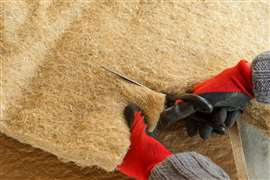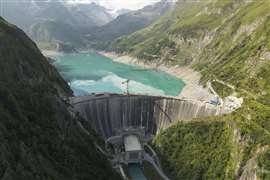Read this article in Français Deutsch Italiano Português Español
US EPA announces grants to investigate novel construction materials
19 July 2024
The US Environmental Protection Agency (EPA) said it will hand out US$160 million in grants to programmes measuring the environmental impact of novel construction materials.
 A construction materials and concrete site. (Image: Adobe Stock)
A construction materials and concrete site. (Image: Adobe Stock)
Almost 40 organisations and institutions were selected to receive funding, which varied by award amount from as low as $282,000 up to $10 million.
The materials under investigation include common construction elements like aluminium, concrete, steel, wood and more.
“The goal of this grant programme is to support businesses that manufacture construction materials and products to develop and verify Environmental Product Declarations (EPDs), and states, Indian Tribes, and nonprofit organisations that will support such businesses,” said the EPA in its grant selection summary.
The grants are dolled out amid global concerns over industry ‘greenwashing’ of material data. Greenwashing is using false or misleading statements and data to suggest a particularly product or process is more environmentally-friendly than it really is.
Further, the grants may seek to develop language and a process to better define and measure materials’ environmental impact.
Awards are not official until a Notice of Award is signed by the EPA Award Official and issued by the EPA Office of Grants and Debarment. The list of unofficial winners can be viewed here.
The six largest EPA grant amounts for investigating construction materials
Two organisations were selected to receive $10 million (the highest amount on the list) as part of the programme.
The American Center for Life Cycle Assessment (ACLCA), which is based in Washington D.C., was selected for one of the two highest gift amounts to “yield an adoptable framework to reduce embodied greenhouse gas emissions in construction materials and products.”
The EPA added, “The project’s goals are to increase the number of practitioners in the field by establishing life cycle assessment competencies and other industry standards, to enhance environmental product declaration standardisation across sectors by updating and enhancing ACLCA’s product category rule (PCR) guidance and a PCR repository, and to establish a life cycle inventory data centre to curate and support background data for use in PCRs.”
Also selected to receive $10 million was the National Asphalt Pavement Association, which is headquartered in Maryland.
 Hemp-based insulation is cut for fiber-bonded panels. The US Hemp Building Institute is set to receive a $6.2 million grant from the US EPA. (Image: Adobe Stock)
Hemp-based insulation is cut for fiber-bonded panels. The US Hemp Building Institute is set to receive a $6.2 million grant from the US EPA. (Image: Adobe Stock)
“This project will focus on making EPDs for asphalt mixtures more robust and broadly available by improving the existing EPD program and providing rebates for companies who publish EPDs, enabling the assessment of the full life cycle of flexible pavement by establishing a flexible pavement PCR or LCA standard and related tools, and implementing workforce development and education programs on EPDs for asphalt mixtures and whole-life EPDs or LCAs for flexible pavements,” said the EPA.
Additionally, the EPA said the project will create tools and resources for flexible pavement life cycle assessments, including datasets for construction, maintenance and end-of-life scenarios.
At just less than $10 million was the University of Washington and the Prestressed Concrete Institute (PCI), which was selected to receive the second and third highest grant amounts of $9.99 million and $9.98 million, respectively.
The Washington initiative – named Validating and Expanding Research and Education for LCA Policy – addresses two primary challenges in the construction industry: the underdevelopment of EPDs and the scarcity of skilled LCA professionals. The project seeks to improve the robustness of EPD data and methods while simultaneously advancing LCA education for students and professionals, said the EPA.
The agency noted the Illinois-based PCI project focuses on updating the precast PCR and producing product-specific EPDs across three trade associations: PCI, the National Precast Concrete Association (NPCA) and the American Concrete Pipe Association (ACPA).
STAY CONNECTED


Receive the information you need when you need it through our world-leading magazines, newsletters and daily briefings.
CONNECT WITH THE TEAM











